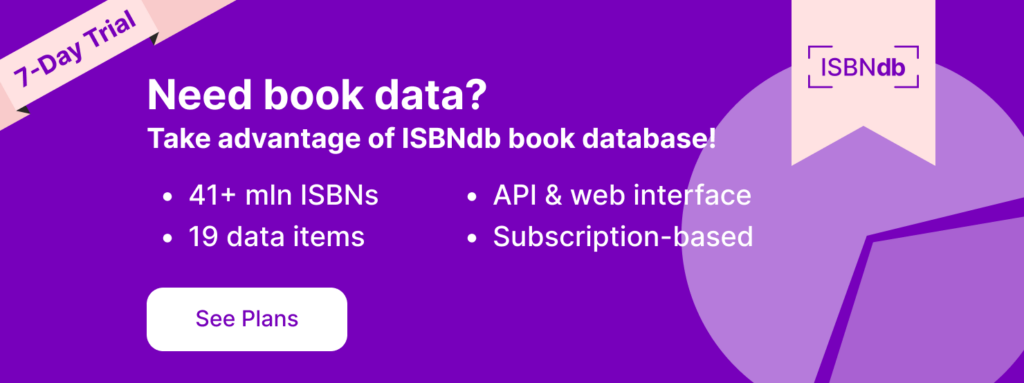 In the world of books and literature, there’s a key element that might not always catch the spotlight but plays an essential role in connecting stories with their readers: book metadata.
In the world of books and literature, there’s a key element that might not always catch the spotlight but plays an essential role in connecting stories with their readers: book metadata.
This behind-the-scenes hero is essential for finding, categorizing, and enjoying books, especially when stories move from printed pages to digital displays.
Let’s take a look at what book metadata is all about!
- What is Book Metadata?
- Why Does Book Metadata Matter?
- Book Metadata: Then and Now
- Global Book Numbers: How Many Books Are in the World?
- Understanding the Book API
- The Power of ISBN Lookup
- Metadata and Search Optimization
- The Future of Book Metadata
- Book Metadata in the Digital Era
What is Book Metadata?
What exactly is book metadata? You can think of it as the identity card for a book – it’s a collection of important details that make each book distinct. This includes the basics, like the book’s title, the author, the International Standard Book Number (ISBN), the publisher, and the publication date.
But it’s not just about these basic details. Book metadata also covers the genres, keywords, descriptions, and even the cover images. Basically, it’s about how books are organized, categorized, and even marketed on different platforms.
Why Does Book Metadata Matter?
Beyond simply ordering and labeling, book metadata plays a critical role in various aspects of the book’s lifecycle and its audience’s experience. Here are the reasons why it matters:
- Enhances Discoverability: Metadata makes books easier to find for potential readers, which increases their chances of being purchased and read.
- Boosts Sales for Authors and Publishers: Effective metadata can significantly impact sales and make a book a top seller by making it more visible and appealing.
- Guides Librarians and Book Enthusiasts: Metadata acts as a compass for those managing or exploring large collections and leads to the right book among countless options.
- Facilitates Online Searches: Metadata is vital for connecting online search queries with the most relevant books that are tailored to the reader’s interests.
- Improves Market Placement: Proper metadata guarantees that a book is categorized and placed correctly in both physical and online marketplaces.
- Supports Reader Engagement: By providing comprehensive details about a book, metadata helps readers make informed decisions and enhances their overall reading experience.
In both physical and digital libraries, metadata determines how books are sorted, categorized, and discovered. In bookstores, metadata influences everything from shelf placement to online listings. It guides readers and buyers as they navigate through countless titles. The precision and accuracy of metadata can significantly impact a book’s findability and success.
Book Metadata: Then and Now
In the past, metadata was straightforward – a simple cataloging tool. Today, it’s a dynamic, multifaceted strategy integral to the marketing and selling of books, especially online.
Book metadata guides readers to the right book. It’s the core ingredient that enhances a book’s visibility on online platforms. Well-crafted metadata helps ensure a book appears in relevant searches, reaching its intended audience.
This connection between metadata and visibility is particularly important in online book marketplaces.
Global Book Numbers: How Many Books Are in the World?
Considering the sheer volume of books published globally, the scale of available book data is fascinating. Estimates, including Google’s 2010 count and annual figures from UNESCO, suggest over 158 million unique books worldwide. This makes it very clear that managing such extensive metadata is quite a challenge.
It also shows us the importance of efficient metadata management so that every book, regardless of its origin or language, is discoverable and accessible to readers worldwide.
Read our article on How Many Books Are in The World if you’re interested in discovering more insights into the staggering number of books, each with its unique metadata fingerprint.
Understanding the Book API
Book APIs have become important tools in managing and accessing book metadata. These Application Programming Interfaces allow seamless interaction between different software applications, facilitating the exchange and updating of book metadata across various platforms.
The role of these APIs is not just technical but transformative. They streamline how metadata is handled, enhance accuracy, and guarantee that up-to-date information is readily available.
The Power of ISBN Lookup
Did you know that ISBN lookup is more than just spotting a book? It’s like opening a door to a world filled with valuable info that authors, publishers, librarians, and book lovers find essential.
The ISBN, or International Standard Book Number, is like a magic key. It reveals all sorts of details about a book – think about its title, author, and publisher, for instance. Understanding how to use ISBN lookup is pretty important.
Performing an ISBN lookup is straightforward. Simply enter the ISBN – typically found on the back cover or inside the book – into a dedicated ISBN search tool or a library database. This will instantly provide a detailed book profile, including publication information and availability.
Metadata and Search Optimization
Metadata’s influence extends to search optimization on selling platforms and library databases. It’s a vital factor in guaranteeing that a book appears in relevant search results, which connects the right reader with the right book.
Optimizing book metadata involves strategically using keywords, accurate categorization, and up-to-date information. These techniques enhance a book’s visibility and accessibility, which is key in a highly competitive market.
The Future of Book Metadata
Looking ahead, the significance of book metadata will grow even more. We’re seeing a trend toward richer, more intricate metadata. Why? Because search algorithms are getting smarter and readers’ expectations are rising.
As digital books and online shopping become more common, managing metadata presents exciting new opportunities and challenges. Staying flexible and innovative with metadata strategies is not just helpful – it’s essential.
Book Metadata in the Digital Era
Book metadata is all about making a book visible, easy to find, and successful in a crowded literary market. From the simple task of an ISBN lookup to the art of search optimization, getting a handle on metadata can shape a book’s journey from the writer’s mind to the reader’s hands. It also streamlines the process of buying and selling books and textbooks.
Understanding the subtleties of book metadata is vital for anyone wanting to make their mark in the ever-changing world of books and literature. Feel free to read more about how ISBNdb can cover your book metadata needs.








